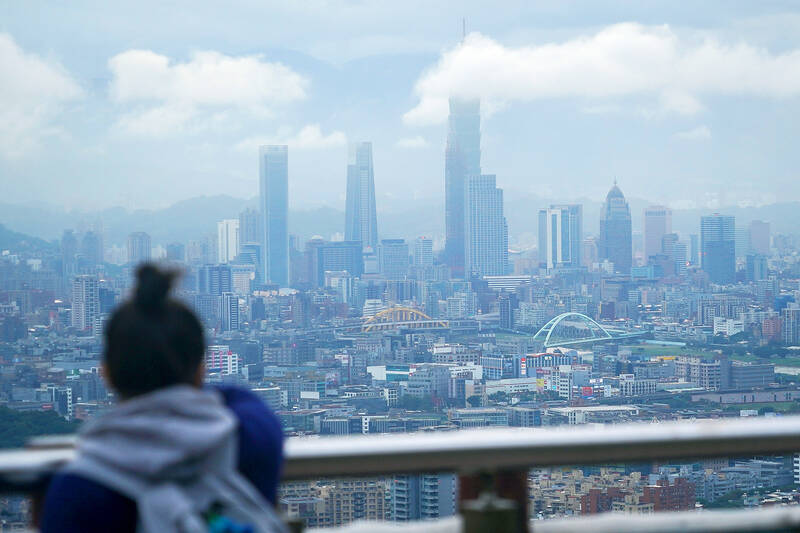Changes to the Equalization of Land Rights Act (平均地權條例) might trigger panic selling of presale house purchase agreements and weigh on overall property deals, real-estate analysts said yesterday.
The amendments, which cleared the legislature yesterday morning, would ban transfers of presale house purchase agreements and require legal entities to obtain permission from their respective governing authority before buying a residential unit.
Evertrust Rehouse Co (永慶房屋) said the legislation in essence limits presale housing projects to buyers with real demand and puts an end to people profiting from reselling purchase agreements that cost relatively little.

Photo: CNA
“The revisions aim to stem short-term property speculation for presale and existing housing, which would help make house prices in Taiwan more reasonable,” Evertrust Rehouse deputy research head Chen Chin-ping (陳金萍) said, adding that unaffordable housing has ranked the No. 1 public complaint over past few years, especially among young people.
Investment-minded holders of presale house contracts would opt out and take a loss if necessary, as some would not have the financial means to absorb the mortgage burdens, Evertrust Rehouse said.
The legislation should succeed in calming house price increase expectations and prevent a bubble from forming, the broker said.
Sinyi Realty Inc (信義房屋) said the requirement that legal entities gain approval before buying real estate would slow luxury house transactions and dampen capital repatriation.
Some people have channeled money from abroad to buy luxury houses in Taiwan to dodge stiff income taxes abroad, while others have used upscale housing to protect themselves from inflation, Sinyi said.
The amendments could discourage such practices, which noticeably cooled last year due to interest rate hikes, unfavorable tax terms and other headwinds, Sinyi said.
H&B Realty Co (住商不動產) said that the slowdown in the local housing market has to do with the amendments being proposed in July last year.
Investors have since fled the market, although they were hoping the government might back off, H&B research manager Jessica Hsu (徐佳馨) said.
“Panic selling looks inevitable and might cause a splash,” Hsu said.
However, it is too early to tell if there would be evident housing price corrections, she said.
Rather, the requirement to gain permission might discourage urban renewal projects, Hsu added.
SEE LAWMAKERS ON PAGE 1

MULTIFACETED: A task force has analyzed possible scenarios and created responses to assist domestic industries in dealing with US tariffs, the economics minister said The Executive Yuan is tomorrow to announce countermeasures to US President Donald Trump’s planned reciprocal tariffs, although the details of the plan would not be made public until Monday next week, Minister of Economic Affairs J.W. Kuo (郭智輝) said yesterday. The Cabinet established an economic and trade task force in November last year to deal with US trade and tariff related issues, Kuo told reporters outside the legislature in Taipei. The task force has been analyzing and evaluating all kinds of scenarios to identify suitable responses and determine how best to assist domestic industries in managing the effects of Trump’s tariffs, he

‘SWASTICAR’: Tesla CEO Elon Musk’s close association with Donald Trump has prompted opponents to brand him a ‘Nazi’ and resulted in a dramatic drop in sales Demonstrators descended on Tesla Inc dealerships across the US, and in Europe and Canada on Saturday to protest company chief Elon Musk, who has amassed extraordinary power as a top adviser to US President Donald Trump. Waving signs with messages such as “Musk is stealing our money” and “Reclaim our country,” the protests largely took place peacefully following fiery episodes of vandalism on Tesla vehicles, dealerships and other facilities in recent weeks that US officials have denounced as terrorism. Hundreds rallied on Saturday outside the Tesla dealership in Manhattan. Some blasted Musk, the world’s richest man, while others demanded the shuttering of his

TIGHT-LIPPED: UMC said it had no merger plans at the moment, after Nikkei Asia reported that the firm and GlobalFoundries were considering restarting merger talks United Microelectronics Corp (UMC, 聯電), the world’s No. 4 contract chipmaker, yesterday launched a new US$5 billion 12-inch chip factory in Singapore as part of its latest effort to diversify its manufacturing footprint amid growing geopolitical risks. The new factory, adjacent to UMC’s existing Singapore fab in the Pasir Res Wafer Fab Park, is scheduled to enter volume production next year, utilizing mature 22-nanometer and 28-nanometer process technologies, UMC said in a statement. The company plans to invest US$5 billion during the first phase of the new fab, which would have an installed capacity of 30,000 12-inch wafers per month, it said. The

Taiwan’s official purchasing managers’ index (PMI) last month rose 0.2 percentage points to 54.2, in a second consecutive month of expansion, thanks to front-loading demand intended to avoid potential US tariff hikes, the Chung-Hua Institution for Economic Research (CIER, 中華經濟研究院) said yesterday. While short-term demand appeared robust, uncertainties rose due to US President Donald Trump’s unpredictable trade policy, CIER president Lien Hsien-ming (連賢明) told a news conference in Taipei. Taiwan’s economy this year would be characterized by high-level fluctuations and the volatility would be wilder than most expect, Lien said Demand for electronics, particularly semiconductors, continues to benefit from US technology giants’ effort